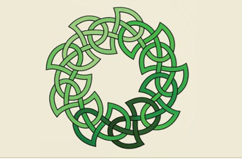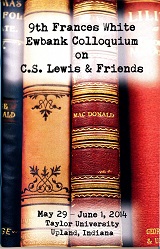Event Title
Paper Session 3-B
Location
Euler 108
Start Date
30-5-2014 2:00 PM
Description
"Heavenly Hierarchy?: The Redemptive Nature of Hierarchy in Tolkien's Middle-Earth" - Richard Cornell
Tolkien's Middle-Earth is a highly stratified and hierarchical world. Although some hierarchies (such as those headed by Sauron & Saruman) are oppressive and malevolent, some (such as those headed by Ilúvatar & Aragorn) are enriching and benevolent. This paper will consider the nature and role of hierarchy in Tolkien's Middle-Earth and specifically attend to the ways in which Tolkien shows hierarchy to be good and ennobling. Furthermore, the paper will demonstrate ways that Tolkien's Christian faith shapes his portrait of hierarchy. A brief conclusion will offer some reflections on how this more positive view of hierarchy might be appropriated today in a society that worships egalitarianism and democracy.
"George MacDonald and J. R. R. Tolkien on Faërie and Fairy Stories" - Paul E. Michelson
The paper discusses the ideas of George MacDonald and J.R.R. Tolkien on Faërie and Fairy Stories, based on an analysis of MacDonald's essay "The Fantastic Imagination," Tolkien's "On Fairy-Stories," Tolkien's correspondence, and Tolkien's unpublished introduction to MacDonald's The Golden Key.
"The Good Catastrophe: Tolkien on the Consolation of the Happy Ending" John Stanifer
When describing the nature of fairy-stories, Tolkien famously coined the term "eucatastrophe" ("eu meaning "good") to express the effect of the "sudden joyous turn" that leads to the story's happy ending regardless of the dark events preceding it. Tolkien applies that word specifically to fairy-stories, but I would like to explore its meaning in relation to other genres and mediums that Tolkien was either unable or unwilling to consider. Classic literature and modern popular culture alike are ripe with the use of the "good" catastrophe, and this device is well-known by cultures from all parts of the globe. If it seems like a stretch to connect Greek linguistics, fairy-stories, British literature, Japanese film, and Korean TV dramas, come listen and let me have the chance to surprise you by demonstrating how much all of these have in common.
Event Type
Paper
Link to Papers
Heavenly Hierarchy?: The Redemptive Nature of Hierarchy in Tolkien's Middle-Earth (Not available)
George MacDonald and J.R.R. Tolkien on Faerie and Fairy Stories
The Good Catastrophe: Tolkien on the Consolation of the Happy Ending
Paper Session 3-B
Euler 108
"Heavenly Hierarchy?: The Redemptive Nature of Hierarchy in Tolkien's Middle-Earth" - Richard Cornell
Tolkien's Middle-Earth is a highly stratified and hierarchical world. Although some hierarchies (such as those headed by Sauron & Saruman) are oppressive and malevolent, some (such as those headed by Ilúvatar & Aragorn) are enriching and benevolent. This paper will consider the nature and role of hierarchy in Tolkien's Middle-Earth and specifically attend to the ways in which Tolkien shows hierarchy to be good and ennobling. Furthermore, the paper will demonstrate ways that Tolkien's Christian faith shapes his portrait of hierarchy. A brief conclusion will offer some reflections on how this more positive view of hierarchy might be appropriated today in a society that worships egalitarianism and democracy.
"George MacDonald and J. R. R. Tolkien on Faërie and Fairy Stories" - Paul E. Michelson
The paper discusses the ideas of George MacDonald and J.R.R. Tolkien on Faërie and Fairy Stories, based on an analysis of MacDonald's essay "The Fantastic Imagination," Tolkien's "On Fairy-Stories," Tolkien's correspondence, and Tolkien's unpublished introduction to MacDonald's The Golden Key.
"The Good Catastrophe: Tolkien on the Consolation of the Happy Ending" John Stanifer
When describing the nature of fairy-stories, Tolkien famously coined the term "eucatastrophe" ("eu meaning "good") to express the effect of the "sudden joyous turn" that leads to the story's happy ending regardless of the dark events preceding it. Tolkien applies that word specifically to fairy-stories, but I would like to explore its meaning in relation to other genres and mediums that Tolkien was either unable or unwilling to consider. Classic literature and modern popular culture alike are ripe with the use of the "good" catastrophe, and this device is well-known by cultures from all parts of the globe. If it seems like a stretch to connect Greek linguistics, fairy-stories, British literature, Japanese film, and Korean TV dramas, come listen and let me have the chance to surprise you by demonstrating how much all of these have in common.


